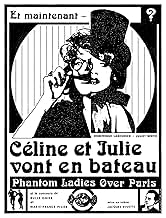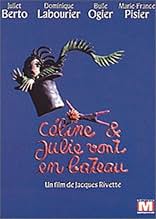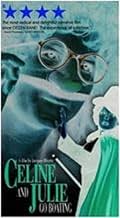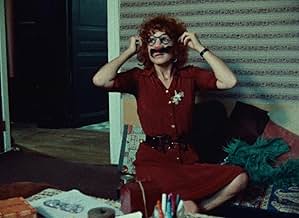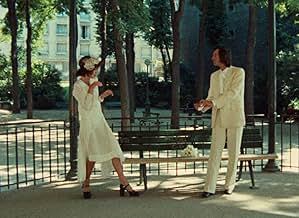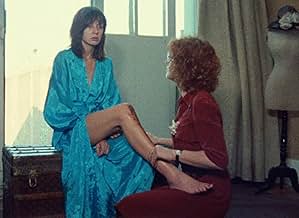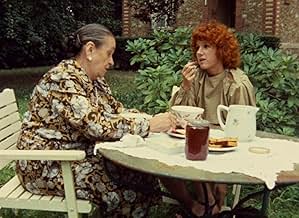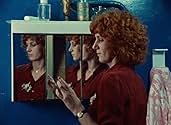Céline e Julie Vão de Barco
Título original: Céline et Julie vont en bateau : Phantom Ladies Over Paris
AVALIAÇÃO DA IMDb
7,2/10
6,8 mil
SUA AVALIAÇÃO
Um par de moças, misteriosamente conectadas, descobrem que suas vidas cotidianas são prejudicadas por um estranho melodrama íntimo, que se desenrola em uma realidade paralela alucinante.Um par de moças, misteriosamente conectadas, descobrem que suas vidas cotidianas são prejudicadas por um estranho melodrama íntimo, que se desenrola em uma realidade paralela alucinante.Um par de moças, misteriosamente conectadas, descobrem que suas vidas cotidianas são prejudicadas por um estranho melodrama íntimo, que se desenrola em uma realidade paralela alucinante.
- Direção
- Roteiristas
- Artistas
- Prêmios
- 1 vitória no total
Jean-Claude Biette
- Spectateur au cabaret
- (não creditado)
Jacques Bontemps
- Lecteur à la bibliothèque
- (não creditado)
Michel Caen
- Spectateur au cabaret
- (não creditado)
Avaliações em destaque
Some directors use less than 2% of their footage in the final cut but Rivette must have used 92% of his to make this - perhaps he used absolutely everything, including, apparently, out-takes. Tedium sometimes has a point, but not here. This is annoying-tedium for every scene seems calculated to test our patience. There's no humour or verve or flair or great lines or classic scenes, not even sad attempts at those things, only a forced drollerie that falls flat in every scene There is endless silly giggling, scenes such as those in the nightclub that are just tiresome to watch, fantasy sequences that are presumably meant to look like a corny TV sitcom, but, lacking any scrap of humour, the point is entirely lost and the actors flounder. The girls try far too hard to be cute, and only succeed in being cloying. And I'm waiting for a director to grasp this simple truth: that giving the actors free rein does not make the action more spontaneous and natural, only more strangulated, more self-conscious, more unnatural and cringe-inducing than if they were following a consistent and meticulous script.
After a while you realise Rivette is just playing silly buggers. Fluffed lines are left in, characters glance inadvertently-deliberately at the camera. Rivette will be saying: 'Regard, c'est un film that is pas un film, we're deliberatement toying avec your illusions'. I'm saying: Vous etes un wankeur.
Why three hours? A Senses of Cinema article is eager to explain: 'The tradition of rigid adherence to the 90 minute to 2-hour time frame, enforced by the laws of free market capitalism, is exploded by Rivette. As a filmmaker, Rivette refuses to confine himself to these arbitrary lengths, or to the even more arbitrary, if unspoken, rules about demands on subject matter and mise-en-scène in films of epic length. Instead, Rivette extends the lengths of his films to a point beyond necessity, where it is understood that the film's length in and of itself is a statement about the system he works in and rebels against.' 3 hours simply to defy (capitalistic??) convention? Wankeur.
The audience are the dupes here - poked fun at for trying to apply reality to what is self-consciously only a film. This is not New Wave. I'm gazetting Rivette as a hanger-on, a copyist. He wants to shoot in the style of Rohmer, but he hasn't got Rohmer's indefinable deftness. He wants to break the rules like Godard but he has not got Godard's indefinable style or charisma. He wants to say something meaningful in an offhand way, like Truffaut, but he hasn't got that indefinable intellect for it. All he can do is try. You can feel him trying. It boils down to a single lame joke that isn't funny and a single idea that isn't clever. Three hours of film-flam, tiresome beyond belief.
After a while you realise Rivette is just playing silly buggers. Fluffed lines are left in, characters glance inadvertently-deliberately at the camera. Rivette will be saying: 'Regard, c'est un film that is pas un film, we're deliberatement toying avec your illusions'. I'm saying: Vous etes un wankeur.
Why three hours? A Senses of Cinema article is eager to explain: 'The tradition of rigid adherence to the 90 minute to 2-hour time frame, enforced by the laws of free market capitalism, is exploded by Rivette. As a filmmaker, Rivette refuses to confine himself to these arbitrary lengths, or to the even more arbitrary, if unspoken, rules about demands on subject matter and mise-en-scène in films of epic length. Instead, Rivette extends the lengths of his films to a point beyond necessity, where it is understood that the film's length in and of itself is a statement about the system he works in and rebels against.' 3 hours simply to defy (capitalistic??) convention? Wankeur.
The audience are the dupes here - poked fun at for trying to apply reality to what is self-consciously only a film. This is not New Wave. I'm gazetting Rivette as a hanger-on, a copyist. He wants to shoot in the style of Rohmer, but he hasn't got Rohmer's indefinable deftness. He wants to break the rules like Godard but he has not got Godard's indefinable style or charisma. He wants to say something meaningful in an offhand way, like Truffaut, but he hasn't got that indefinable intellect for it. All he can do is try. You can feel him trying. It boils down to a single lame joke that isn't funny and a single idea that isn't clever. Three hours of film-flam, tiresome beyond belief.
Last year, at a crisis time of imminent homelessness, I went to the video store with the idea of renting some banal new release to distract me from my troubles. Waiting in line holding a video starring Tom Hanks (or was it Kevin Costner? Maybe it was Julia Roberts. Such a blur is Hollywood today) something in the foreign section an aisle down caught my eye. It was the video for Jacques Rivette's 1974 masterpiece, Celine and Julie Go Boating.
Immediately upon seeing the cover image of Juliet Berto (Celine) posed as a magician, her Dietrich hauteur kinky and comical, I knew it would be my kind of film. I was also pleased to see it was such a long film it had to be contained in a two-video set. It had long been my suspicion that all secrets of life would be revealed in a film over three hours long and in French.
Indeed, Celine and Julie is just that film. But it conceals as it reveals, which is to say that its great mysteriousness results from its floribundance of revelation. Yes, my friend, a floribundance! I never even thought of such a word until seeing Celine and Julie.
Critics have been unable to explain what it's "about". I cannot. I can't explain the plays of Shakespeare or the poems of Emily Dickinson, but I am moved by them. Attempts to understand them can lead to intense mental spasmodics, but the pain, if the work is good, can be great.
Those who've seen the film will remember the hard magic candy the women savored on their own path to understanding. Vision giving, the candy became an addiction to them. Once is never enough and hasn't been for me. I have seen Celine and Julie three times and thought of it many more.
My favorite scene is where Celine performs her weird magic act in a nightclub where, as far as I can tell, the customers are all convicted poets. The atmosphere there is fascinating. Time stops while she does her act, which is beyond words, indescribable. The whole feeling in that scene of a kind of super sophisticated moment of comedy and sex and mystery all shared by a group of people in silence is one that I find marvelously inspiring. Surely some clever entrepreneur in San Francisco, where I reside, could open such a club. Oh, I suppose it won't happen, but at least one can dream.
Really, it's the importance, power and pleasure-pain of dreaming that this film reawakended me to when I saw it months ago. To be like Celine and Julie with their minds moved by candy is a state I aspire to daily.
When I was briefly without a place to live, I thought of this film and was taken to a sunny day in Montmarte, a house where the living and unliving mingle, a library where stalkers and smokers meet. I savored that magic, the effect of great art on the mind, and I knew I was not truly homeless.
Immediately upon seeing the cover image of Juliet Berto (Celine) posed as a magician, her Dietrich hauteur kinky and comical, I knew it would be my kind of film. I was also pleased to see it was such a long film it had to be contained in a two-video set. It had long been my suspicion that all secrets of life would be revealed in a film over three hours long and in French.
Indeed, Celine and Julie is just that film. But it conceals as it reveals, which is to say that its great mysteriousness results from its floribundance of revelation. Yes, my friend, a floribundance! I never even thought of such a word until seeing Celine and Julie.
Critics have been unable to explain what it's "about". I cannot. I can't explain the plays of Shakespeare or the poems of Emily Dickinson, but I am moved by them. Attempts to understand them can lead to intense mental spasmodics, but the pain, if the work is good, can be great.
Those who've seen the film will remember the hard magic candy the women savored on their own path to understanding. Vision giving, the candy became an addiction to them. Once is never enough and hasn't been for me. I have seen Celine and Julie three times and thought of it many more.
My favorite scene is where Celine performs her weird magic act in a nightclub where, as far as I can tell, the customers are all convicted poets. The atmosphere there is fascinating. Time stops while she does her act, which is beyond words, indescribable. The whole feeling in that scene of a kind of super sophisticated moment of comedy and sex and mystery all shared by a group of people in silence is one that I find marvelously inspiring. Surely some clever entrepreneur in San Francisco, where I reside, could open such a club. Oh, I suppose it won't happen, but at least one can dream.
Really, it's the importance, power and pleasure-pain of dreaming that this film reawakended me to when I saw it months ago. To be like Celine and Julie with their minds moved by candy is a state I aspire to daily.
When I was briefly without a place to live, I thought of this film and was taken to a sunny day in Montmarte, a house where the living and unliving mingle, a library where stalkers and smokers meet. I savored that magic, the effect of great art on the mind, and I knew I was not truly homeless.
10ella-48
As a teenager in the 1970s, I was a frequent visitor to an art gallery in Liverpool called the Open Eye. When they started a film club, promising to show all the stuff I had read about but would never otherwise get a chance to see, I signed up like a flash.
It was a humble affair: a bare room with temporary blackouts on the windows, a makeshift screen at one end, a projector at t'other and a dozen or so ill-assorted chairs inbetween, but I loved it. For me it was a magic grotto: a portal to another place of endless fascination and discovery. It was here that I had my first exposure to the works of Buñuel, Renoir, Fritz Lang; Dziga Vertov's "Man With a Movie Camera"; the experimental shadowgraph animations of Man Ray; David Lynch's Eraserhead and, unforgettably, "Céline et Julie vont en bateau".
Even for one as keen on "Art" cinema as I was, Céline et Julie was a bit of a challenging prospect: a low-budget French thing about god-knows-what, by a director I'd never heard of, that we were warned would run over three hours without interval. Little did I know, as the opening credits rolled, that from then on time would mean nothing and I would be held captive; enthralled; the hours slipping by unheeded, as when dreaming.
It is this quality that, for me, makes this film so special. European (especially French) cinema is full of works that lay claim to the label "Surrealist". I have to say that in my opinion most of them have little to do with the truly surreal at all. More often than not they are simply a cocktail of absurdism and social satire.
Céline et Julie, on the other hand, is a genuinely surreal film possibly the ONLY genuinely surreal film ever made (!) - insomuch that its narrative (and hence the experience of watching it unfold) is uncannily dreamlike. From the outset the viewer is drawn inexorably forward by a teasing sense of curiosity. Frequently along the way there seems to be far too much going on that is unexplained, and little hope of fitting it all together, yet one cannot help but remain in the story. In time, we become aware that our mixed sensations as viewer are mirroring those being experienced by Céline and Julie and thus we find ourselves in that familiar condition of the dreamer: of being simultaneously both onlooker and protagonist in our own drama.
Afterwards, I was left feeling curiously elated, yet struggling to recall its details with any precision. The impressions it had left behind were powerful and thought-provoking, yet intangible, and recalled but imperfectly, in the manner of one who has just awoken: with a frustrating uncertainty as to exactly what had occurred, to whom and in what order. Any attempt to explain it to a third party was equally doomed. Just as with a half-remembered dream, the very act of telling caused the peculiar para-logic of the narrative to disintegrate, and I'd be left speechless.
It's been part of me ever since. Over the last 30-odd years, the themes and images of this film have, in the nicest possible way, haunted me: lurking in the shadows of consciousness, beyond the clumsy reach of rational query, quietly informing my imagination, to appear, unbidden, in subtle and unexpected ways in my own creative output.
The whole strange business has been made all the more uncanny by the fact that, throughout those 30-odd years, the film itself has been lost to me. Having experienced it the once, I was never able to find Céline et Julie again, nor any reference to it, even in the pages of famously trusted and supposedly 'comprehensive' movie guides. Likewise, whenever I mentioned the film in conversation I could never come across anyone who had ever heard of it. Having worked its mischief, the contrary creature had melted back into the half-light, leaving no trace of its existence.
Then, in October of 2006, a miracle: there it was, right in front of me, listed in the TV schedules! Film4 was showing it at the suitably unconscious hour of 3am. Unwilling to risk losing it for another 30 years to the vagaries of my video recorder's dodgy timer, I sat up, my finger hovering nervously over the Record button...
A few days later, having found an afternoon in which we were free of commitments, my partner and I settled in to watch it: she with some scepticism that she would be able to maintain her interest for the whole 3 hours, and me both a-quiver with anticipation and privately praying that, in the hard light of reality, this thing of treasured half-memory would not prove itself to be The Worst Load Of Pretentious Tripe Ever Made.
I needn't have worried. No sooner had I hit "Play" than that fragrant, familiar magic began weaving itself all over again. I am delighted to report that Céline et Julie is just as powerful an experience now as it was in my youth.
What I had forgotten, or perhaps never noticed at all on first viewing, was just what a rough-edged, homespun creature it is in technical terms. It was shot entirely on location, on 16mm and with a very small crew, and it shows. The soundtrack is patchy in places and frequently prey to whatever ambient sounds were present when the camera rolled (usually Parisian traffic noise). Now and then the acting is self-conscious, and some of the reaction shots are clumsily done. In the end, though, none of this matters a damn. Indeed, it is the film's very lack of studio polish that gives it much of its special flavour. Céline et Julie is an imperfect creation, but an honest one. It is also charming, playful and frequently hilarious. As such, I recommend it unreservedly.
It was a humble affair: a bare room with temporary blackouts on the windows, a makeshift screen at one end, a projector at t'other and a dozen or so ill-assorted chairs inbetween, but I loved it. For me it was a magic grotto: a portal to another place of endless fascination and discovery. It was here that I had my first exposure to the works of Buñuel, Renoir, Fritz Lang; Dziga Vertov's "Man With a Movie Camera"; the experimental shadowgraph animations of Man Ray; David Lynch's Eraserhead and, unforgettably, "Céline et Julie vont en bateau".
Even for one as keen on "Art" cinema as I was, Céline et Julie was a bit of a challenging prospect: a low-budget French thing about god-knows-what, by a director I'd never heard of, that we were warned would run over three hours without interval. Little did I know, as the opening credits rolled, that from then on time would mean nothing and I would be held captive; enthralled; the hours slipping by unheeded, as when dreaming.
It is this quality that, for me, makes this film so special. European (especially French) cinema is full of works that lay claim to the label "Surrealist". I have to say that in my opinion most of them have little to do with the truly surreal at all. More often than not they are simply a cocktail of absurdism and social satire.
Céline et Julie, on the other hand, is a genuinely surreal film possibly the ONLY genuinely surreal film ever made (!) - insomuch that its narrative (and hence the experience of watching it unfold) is uncannily dreamlike. From the outset the viewer is drawn inexorably forward by a teasing sense of curiosity. Frequently along the way there seems to be far too much going on that is unexplained, and little hope of fitting it all together, yet one cannot help but remain in the story. In time, we become aware that our mixed sensations as viewer are mirroring those being experienced by Céline and Julie and thus we find ourselves in that familiar condition of the dreamer: of being simultaneously both onlooker and protagonist in our own drama.
Afterwards, I was left feeling curiously elated, yet struggling to recall its details with any precision. The impressions it had left behind were powerful and thought-provoking, yet intangible, and recalled but imperfectly, in the manner of one who has just awoken: with a frustrating uncertainty as to exactly what had occurred, to whom and in what order. Any attempt to explain it to a third party was equally doomed. Just as with a half-remembered dream, the very act of telling caused the peculiar para-logic of the narrative to disintegrate, and I'd be left speechless.
It's been part of me ever since. Over the last 30-odd years, the themes and images of this film have, in the nicest possible way, haunted me: lurking in the shadows of consciousness, beyond the clumsy reach of rational query, quietly informing my imagination, to appear, unbidden, in subtle and unexpected ways in my own creative output.
The whole strange business has been made all the more uncanny by the fact that, throughout those 30-odd years, the film itself has been lost to me. Having experienced it the once, I was never able to find Céline et Julie again, nor any reference to it, even in the pages of famously trusted and supposedly 'comprehensive' movie guides. Likewise, whenever I mentioned the film in conversation I could never come across anyone who had ever heard of it. Having worked its mischief, the contrary creature had melted back into the half-light, leaving no trace of its existence.
Then, in October of 2006, a miracle: there it was, right in front of me, listed in the TV schedules! Film4 was showing it at the suitably unconscious hour of 3am. Unwilling to risk losing it for another 30 years to the vagaries of my video recorder's dodgy timer, I sat up, my finger hovering nervously over the Record button...
A few days later, having found an afternoon in which we were free of commitments, my partner and I settled in to watch it: she with some scepticism that she would be able to maintain her interest for the whole 3 hours, and me both a-quiver with anticipation and privately praying that, in the hard light of reality, this thing of treasured half-memory would not prove itself to be The Worst Load Of Pretentious Tripe Ever Made.
I needn't have worried. No sooner had I hit "Play" than that fragrant, familiar magic began weaving itself all over again. I am delighted to report that Céline et Julie is just as powerful an experience now as it was in my youth.
What I had forgotten, or perhaps never noticed at all on first viewing, was just what a rough-edged, homespun creature it is in technical terms. It was shot entirely on location, on 16mm and with a very small crew, and it shows. The soundtrack is patchy in places and frequently prey to whatever ambient sounds were present when the camera rolled (usually Parisian traffic noise). Now and then the acting is self-conscious, and some of the reaction shots are clumsily done. In the end, though, none of this matters a damn. Indeed, it is the film's very lack of studio polish that gives it much of its special flavour. Céline et Julie is an imperfect creation, but an honest one. It is also charming, playful and frequently hilarious. As such, I recommend it unreservedly.
A PERFECT, SHARED IMAGINATION: something we become entirely incapable of evoking in our adult lives. As children, it's still possible to create an all-engrossing, parallel existence played out in symbiotic harmony by two individuals calling themselves best friends. With an uncluttered and unfettered creativity, these friends are sucked into their inner story to a point that time, place and the mundane habits and duties of one's routine no longer exist, or rather, are incorporated and/or adapted to fit what then becomes one's main existence - the imagined one. What makes this movie so convincingly evoke the yearning for the magic of childhood is exactly this: the fact that this imaginative world is shared so perfectly by two friends, and not just cultivated within an isolation and individuality typical of adult age. No other movie has made me think back at my childhood best friends as vividly as Céline and Julie Go Boating!
Hours spent in a room surrounded by familiar objects turned into so many powerful talismans. Earnest "magic" rituals punctuated by benevolent, mutual derision in the little moments in which one risks getting too serious or devoid of irony. Convulsive giggling fits which end in snorting noises. Relaxed, spontaneous, touchy-feely languid poses making two friends feel like they fit each other's company like a glove. Living the present so perfectly that one is momentarily, blissfully freed of any baggage from the past or the insecurities for the future that stunt one's spontaneity in the present. This isn't just a definition of perfect, child-like friendship, but also of a simple, uncluttered state of pure happiness. Rivette captures the spirit of all these things - childhood and happiness - in a movie unlike any I've seen before. Or rather - the movie may have seemed familiar thematically, but the execution and spirit of it was something else altogether.
As other users have commented here, Céline and Julie Go Boating is inspired by both Alice's Adventures in Wonderland and Henry James, as well as being reminiscent of Buñuel - not just his "surreal" movies but also That Obscure Object of Desire. In the latter, Carole Bouquet and Angela Molina play the same character interchangeably. Céline and Julie do the same when they both, interchangeably play the nurse in the closed-circuit, story-in-the-story involving the man, the blonde woman, the brunette woman and the little girl in the "haunted" house - this story's plot is being played out over and over again in the two protagonists' heads as they strive to both figure its intrigue and the dark heart of its mystery out, all the while deriding the stuffy rhetoric of its melodrama (delightful!). There are clear echoes of Bergman's Persona as well, as Céline and Julie stand in for each other - namely, Céline pretends to be Julie when she meets her childhood sweetheart and cousin Guilou, while Julie stands in for Céline when she attends the magician's audition. Touches of Buñuel and Fellini are also evoked by the dream sequences, with their typical, fragmented rhythm which mixes in dreams, reality, thoughts and imagination. Though innovative and timeless, Céline and Julie Go Boating does also belong to the decade in which it was made, as it has a recognisable 1960s/70s surrealist aesthetic and an interest in "inner landscapes", not for their own sake but for what they say about the psychic goings on of human beings.
Purely thematically, this movie also brought to mind Peter Jackson's 1994 movie Heavenly Creatures. However, though the latter was made exactly 20 years later than Céline and Julie, it is decidedly more "misogynistic" in spirit, to be fair perhaps not consciously or intentionally so. Why am I calling Jackson's movie misogynistic? Because ultimately, unlike Céline and Julie Go Boating, it treats the symbiotic, shared, female imagination that's allowed free rein as something negatively irrational, uncontrollable, dark and finally, destructive, the lesbian undertones becoming morbid rather than light-hearted, humorous and feel-good as in the Rivette's splendid and highly original movie.
What this Céline and Julie Go Boating told me was that in some cases, guiltlessly cultivating, salvaging and exploring one's inner and imaginative life is far more important than meeting the expectations of one's day-to-day, material duties. Therefore, solving the mystery of a "haunted" house is more crucial than, say, furthering one's career (for example, succeeding in an audition for an important, international magician's tour - Céline should have attended it but Julie does so instead, to very amusing and disastrous effect! I loved, loved, loved actress Dominique Labourier's droll histrionics during that scene!).
I have never seen a movie treat with such humour and gaiety a subject as serious, complex and potentially heavy-duty Freudian as exploring one's unresolved childhood issues. Much of this movie is about Julie's (and perhaps everyone's, to a degree) inability to assimilate the past completely (her tarot reading by a fellow librarian reveals this at the beginning of the movie - "Your future is in the past"). To put it stereotypically, the "inner child" needs to be freed before one can truly become an adult - a happy, healthy, sorted, serene, childlike adult. This process of healing is punctuated by the two protagonists by playful role-playing (both Céline and Julie have a ball taking on different identities by also donning different costumes throughout the course of the movie), an endless string of occasions for giggling fits and what is essentially a cheerful use of childish "drugs" (candy and home-made magic potions) to evoke that crucial, life-giving shared imagination. In a sentence, the psychic ailments typical of adulthood are cured with the spirit typical of childhood.
Hours spent in a room surrounded by familiar objects turned into so many powerful talismans. Earnest "magic" rituals punctuated by benevolent, mutual derision in the little moments in which one risks getting too serious or devoid of irony. Convulsive giggling fits which end in snorting noises. Relaxed, spontaneous, touchy-feely languid poses making two friends feel like they fit each other's company like a glove. Living the present so perfectly that one is momentarily, blissfully freed of any baggage from the past or the insecurities for the future that stunt one's spontaneity in the present. This isn't just a definition of perfect, child-like friendship, but also of a simple, uncluttered state of pure happiness. Rivette captures the spirit of all these things - childhood and happiness - in a movie unlike any I've seen before. Or rather - the movie may have seemed familiar thematically, but the execution and spirit of it was something else altogether.
As other users have commented here, Céline and Julie Go Boating is inspired by both Alice's Adventures in Wonderland and Henry James, as well as being reminiscent of Buñuel - not just his "surreal" movies but also That Obscure Object of Desire. In the latter, Carole Bouquet and Angela Molina play the same character interchangeably. Céline and Julie do the same when they both, interchangeably play the nurse in the closed-circuit, story-in-the-story involving the man, the blonde woman, the brunette woman and the little girl in the "haunted" house - this story's plot is being played out over and over again in the two protagonists' heads as they strive to both figure its intrigue and the dark heart of its mystery out, all the while deriding the stuffy rhetoric of its melodrama (delightful!). There are clear echoes of Bergman's Persona as well, as Céline and Julie stand in for each other - namely, Céline pretends to be Julie when she meets her childhood sweetheart and cousin Guilou, while Julie stands in for Céline when she attends the magician's audition. Touches of Buñuel and Fellini are also evoked by the dream sequences, with their typical, fragmented rhythm which mixes in dreams, reality, thoughts and imagination. Though innovative and timeless, Céline and Julie Go Boating does also belong to the decade in which it was made, as it has a recognisable 1960s/70s surrealist aesthetic and an interest in "inner landscapes", not for their own sake but for what they say about the psychic goings on of human beings.
Purely thematically, this movie also brought to mind Peter Jackson's 1994 movie Heavenly Creatures. However, though the latter was made exactly 20 years later than Céline and Julie, it is decidedly more "misogynistic" in spirit, to be fair perhaps not consciously or intentionally so. Why am I calling Jackson's movie misogynistic? Because ultimately, unlike Céline and Julie Go Boating, it treats the symbiotic, shared, female imagination that's allowed free rein as something negatively irrational, uncontrollable, dark and finally, destructive, the lesbian undertones becoming morbid rather than light-hearted, humorous and feel-good as in the Rivette's splendid and highly original movie.
What this Céline and Julie Go Boating told me was that in some cases, guiltlessly cultivating, salvaging and exploring one's inner and imaginative life is far more important than meeting the expectations of one's day-to-day, material duties. Therefore, solving the mystery of a "haunted" house is more crucial than, say, furthering one's career (for example, succeeding in an audition for an important, international magician's tour - Céline should have attended it but Julie does so instead, to very amusing and disastrous effect! I loved, loved, loved actress Dominique Labourier's droll histrionics during that scene!).
I have never seen a movie treat with such humour and gaiety a subject as serious, complex and potentially heavy-duty Freudian as exploring one's unresolved childhood issues. Much of this movie is about Julie's (and perhaps everyone's, to a degree) inability to assimilate the past completely (her tarot reading by a fellow librarian reveals this at the beginning of the movie - "Your future is in the past"). To put it stereotypically, the "inner child" needs to be freed before one can truly become an adult - a happy, healthy, sorted, serene, childlike adult. This process of healing is punctuated by the two protagonists by playful role-playing (both Céline and Julie have a ball taking on different identities by also donning different costumes throughout the course of the movie), an endless string of occasions for giggling fits and what is essentially a cheerful use of childish "drugs" (candy and home-made magic potions) to evoke that crucial, life-giving shared imagination. In a sentence, the psychic ailments typical of adulthood are cured with the spirit typical of childhood.
When I first saw this film I was amazed by it. The freshness and the imagination of the two protagonists, the way in which it recognised the magic (real magic) of Paris, and the strange parallel worlds it created in which Celine and Julie are both deeply involved and creating, and then acting, their own parts. On re-viewing it more than ten years later though, I was surprised to be a little disappointed. The magic is so thin. Celine and Julie have taken the, very conscious and explicit, decision not to grow up, and as a result, although they are beautiful adults, their world is a child's world. Their imagination is child-like, in its imagery (sweets, plastic "dinosaur eyes", rather thin puns), in its chosen surroundings (cases full of dolls), its disasters (a grazed knee), its aims (largely disruption of the concerns of surrounding adults), in its ridiculing of sexuality and its steadfast refusal to admit that fantasy is sometimes, necessarily, dangerous. Without any danger or any desperation, it seemed on second visit a charming but slightly futile game.
Você sabia?
- CuriosidadesIt is a misconception that most of the film was improvised by the actors. Jacques Rivette provided structure but did not let his actors "go wild", instead he let them write. A single scene was improvised, where Celine, played by Julie Berto, brags to her associates about her rich American friend. The rest of the scenes where shot from scripted material, mostly thanks to participating actors. The film is collaboration by several authors, including actors Berto, Labourier, Ogier and Pisier. Rivette's involvement in the writing was to give structure to all the contributions, tightening things up.
- Erros de gravaçãoThe last time Julie receives the cigarette from under the table, it is bigger than it was when her colleague handed it to her.
- ConexõesFeatured in Berlin Chamissoplatz (1980)
Principais escolhas
Faça login para avaliar e ver a lista de recomendações personalizadas
- How long is Celine and Julie Go Boating?Fornecido pela Alexa
Detalhes
Bilheteria
- Faturamento bruto nos EUA e Canadá
- US$ 31.452
- Fim de semana de estreia nos EUA e Canadá
- US$ 5.624
- 6 de mai. de 2012
- Faturamento bruto mundial
- US$ 31.452
- Tempo de duração
- 3 h 13 min(193 min)
- Mixagem de som
- Proporção
- 1.37 : 1
Contribua para esta página
Sugerir uma alteração ou adicionar conteúdo ausente


